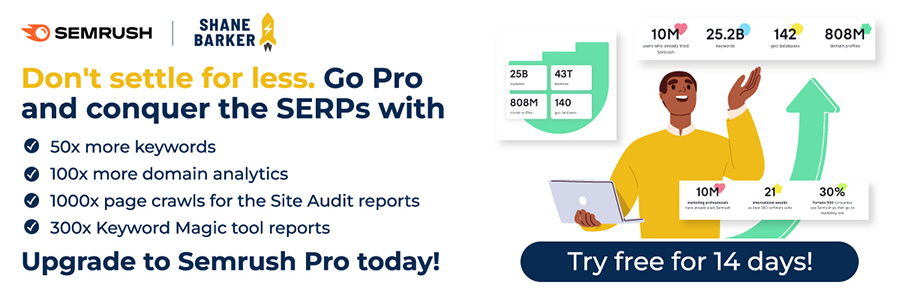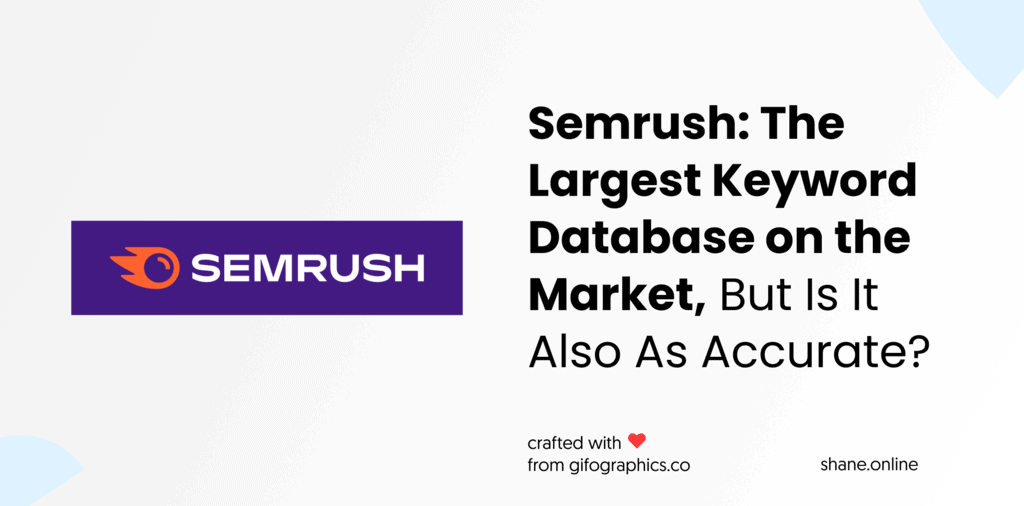Semrush and Google Analytics are powerful web analytics tools for digital marketing specialists. But there is a considerable difference between their use cases.
While Semrush is an external service that helps you study any website (including yours and your competitors), Google Analytics is an internal service that gives you useful insights about the website you own or operate.
Google Analytics traffic and user engagement data has greater accuracy than Semrush. However, the latter gives you the ability to track data for your competitors’ websites as well.
It also helps you with competitive research, SEO, keyword research, link building, PPC, and content marketing.
Comparing their features is crucial but it’s also important to highlight where Semrush and Google Analytics overlap. In this article, I’ll do just that and help you understand why you shouldn’t choose one over the other.
For me, these two analytics platforms are better companions than competitors. That’s why, I’ll also show you how to integrate them to use both to your maximum advantage.
Let’s start with a quick overview of both tools.
What is Semrush?
Semrush is an all-in-one suite of digital marketing tools that helps you with SEO, content marketing, market research, competitive intelligence, advertising, social media marketing, and more.
With Semrush, you get access to useful data, including but not limited to:
- Traffic analytics: Traffic sources, web and mobile traffic share, top pages that drive traffic
- Competitive research: Organic and paid search traffic, number of backlinks, competitors’ best keywords, new competitors, domains’ position changes
- Keyword research: Search volume, keyword difficulty, search intent, SERP analysis, position tracking
- Link building: New backlinks, lost backlinks, referring domains, untapped backlink opportunities, link quality audit, broken links
- SEO audit: Crawled pages, technical issues, content optimization issues
- Content marketing: Topic research, SEO recommendations, post performance tracking, content analysis, poor-performing posts
- PPC: paid search traffic, competitors’ keywords and ad copy, position tracking
- Social analytics: Audience growth, engagement
What is Google Analytics?
Google Analytics is the premier analytics platform for tracking your website or app performance. It gives you a complete picture of how your website traffic and user interactions.
It helps you track and analyze:
- Who is visiting your website?
- Where are these visitors (your audience) coming from?
- Which pages do they visit?
- How much time do they spend on your website and specific web pages?
- What are your top-performing posts or pages?
- Which countries send you minimum or maximum traffic?
- Which keywords do people search for to find your website?
Google Analytics helps you understand your customers and improve your website, free of charge. This makes it a must-have analytics tool in your arsenal.
Semrush vs. Google Analytics – The Comparison Summary
Semrush helps you identify keywords and topics that can help generate more website traffic. It also lets you spy on your competitors’ SEO and content strategies.
And, you can get a domain overview and traffic analytics of any website using Semrush.
However, the traffic analytics data is not as accurate as Google Analytics, which directly mines data from a tracking code added to your website. But again, you can only get Google Analytics data for a website you own or manage.
Another major difference between the two platforms is that Google Analytics helps you understand user behavior on your website.
Here’s a quick comparison of Semrush vs. Google Analytics – features and use cases:
Semrush | Google Analytics | |
Pricing | Plans start from $119.95/month (Save up to 17% if you pay annually.) | Free plan |
Data offered | SEO performance | Website performance and user information |
Real-time traffic | ||
Website traffic | ||
Traffic sources | ||
Traffic comparison between time periods | ||
Visitor demographics, engagement, and interests | ||
User behavior or interaction on your website | ||
Keyword research | ||
Keyword ranking and position tracking | ||
Competitor research | ||
Backlinks tracking | ||
Link-building opportunity hunt | ||
Technical SEO audit of your website | ||
Content marketing tools and SEO writing assistant | ||
Historical performance data of your website | ||
Platforms supported | Desktop Web | Desktop Web iOS Android |
Customer support | Knowledgebase Videos Email and live chat support | Knowledgebase Community forum |
Semrush: Reviewing Its Use Cases, Features, and Data
Semrush is a feature-rich tool, used by over 10 million marketing professionals across the globe. It offers 55+ tools and reports, which are enough to power up your search and marketing performance.
I use it almost every day to do all sorts of things, from finalizing topic ideas to picking up which posts to update each month, and fixing broken links to my website.
Let’s take a look at what Semrush can help you do.
1. Analyze Website Traffic
As I am comparing Semrush with Google Analytics, let me first show you what insights Semrush gives about the traffic of any website. This website could be your own domain or that of your competitors or partners.
The key website traffic metrics Semrush helps you track include:
- The total number of visits
- The number of unique visitors
- The number of pages viewed per visit
- Average session duration
- Bounce rate
- Traffic sources – direct, referral, search, social, paid
- The devices used to browse your website – desktop vs. mobile
- The top pages visited by users
- Top destinations where users go after their visit
- Traffic distribution by country
You can also compare the website traffic of two or more websites and see whether their performance is going up or down over time.

Semrush’s Traffic Analytics data is not as accurate as the data offered by Google Analytics but it’s closest to what any third-party tool can tell about your website.
But the good part is that:
Semrush discloses the accuracy level of all data they provide you with.
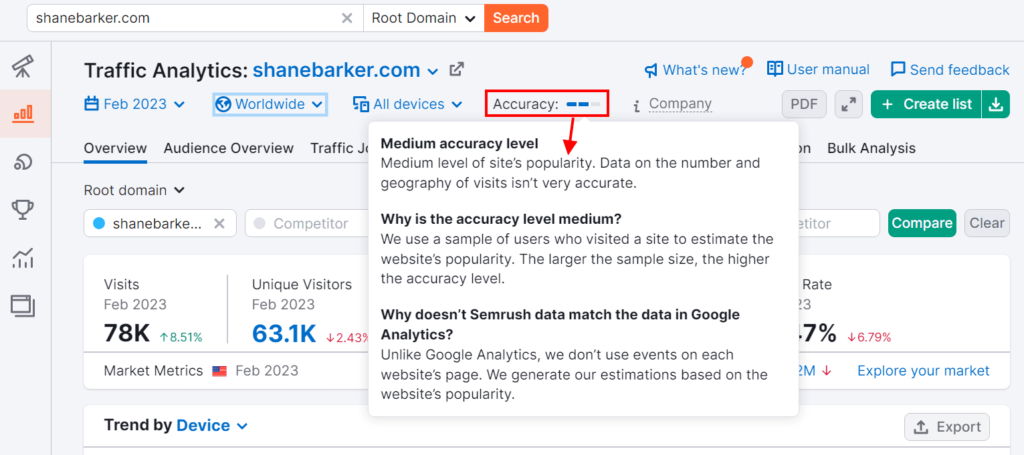
Analyzing my website and content performance using Semrush helped me grow my website traffic from 50K to 90K within six months.
2. Conduct Competitive Research
Semrush allows you to check the overall performance of any domain. You can use it to get instant insights into the strengths and weaknesses of your competitors, partners, or customers.
With Semrush, you can get insights about:
- Domain authority score
- Organic and paid search traffic the website receives
- The distribution of traffic by country
- The total number of backlinks pointing to the website
- The number of keywords the website has SERP positions for
- Keywords that generate maximum organic traffic for the website
- Keyword position tracking over time
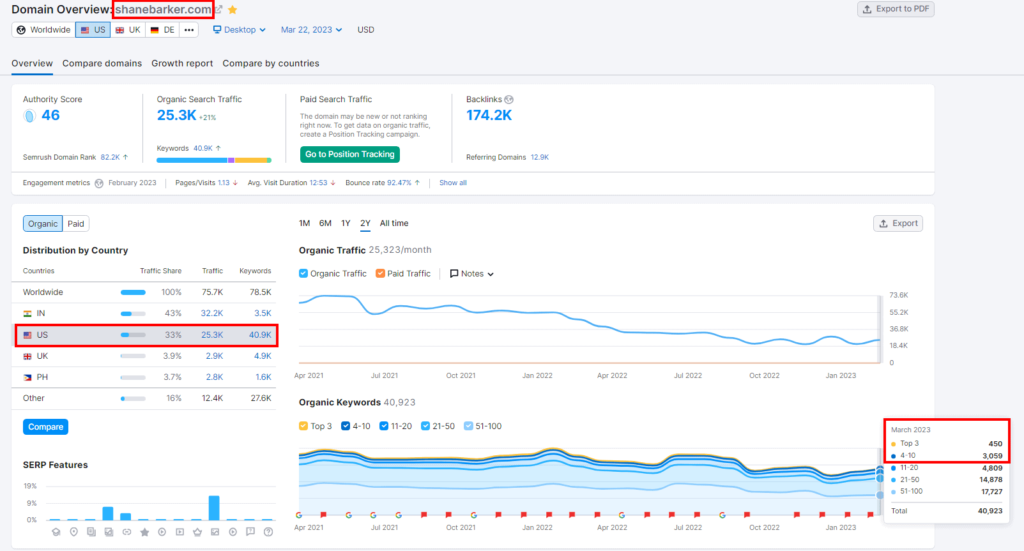
You can compare the numbers between your website and your competitors’ websites.
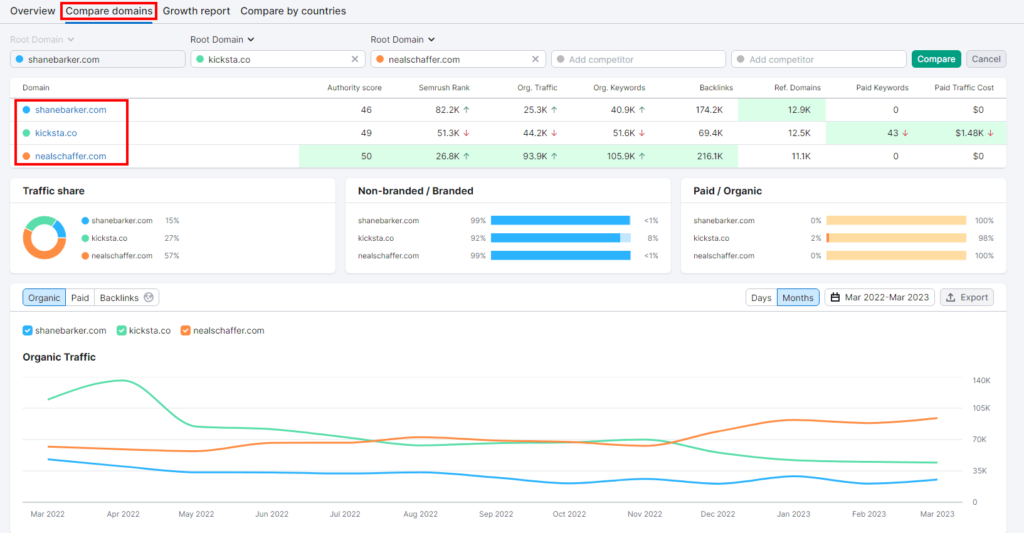
Semrush also helps you find keyword gaps and capitalize on missed or untapped opportunities to improve your website’s search performance.
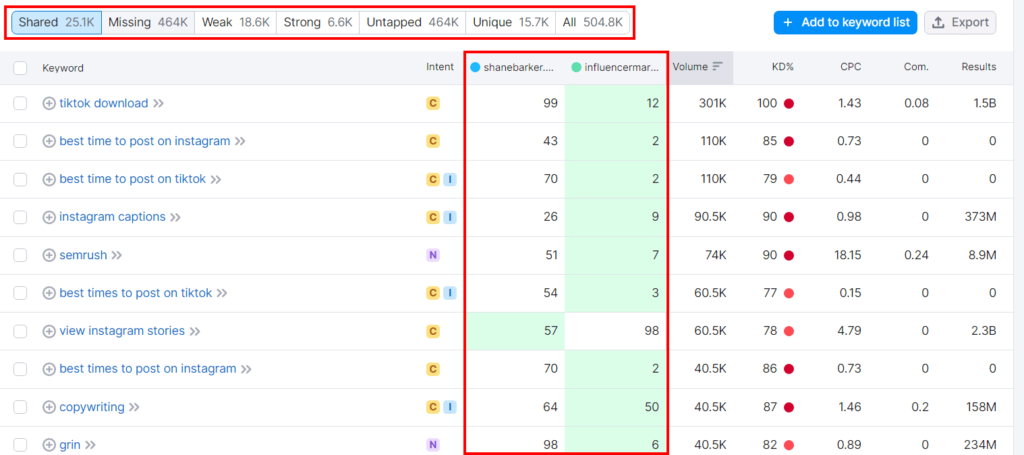
Similarly, you can tap into the missed backlink opportunities by using Semrush to track where your competitors are gaining their backlinks from.
Overall, it has everything you need for competitive analysis.
3. Conduct Keyword Research
Semrush is the tool I use to conduct research for my website’s content. From analyzing which keywords to target to researching the best content types to rank for those keywords, Semrush helps me with it all.
With Semrush’s Keyword Research tool, you can see:
- Average monthly search volume of any keyword
- Keyword difficulty score, which defines how challenging it could be to rank for a particular keyword
- Search intent behind the user’s search for a specific keyword
- Average cost-per-click (CPC) of any keyword
- Keyword variations of your seed keyword
- Related keywords and questions for your seed keyword
- Top posts/pages ranking for the keyword
- Keyword research filters
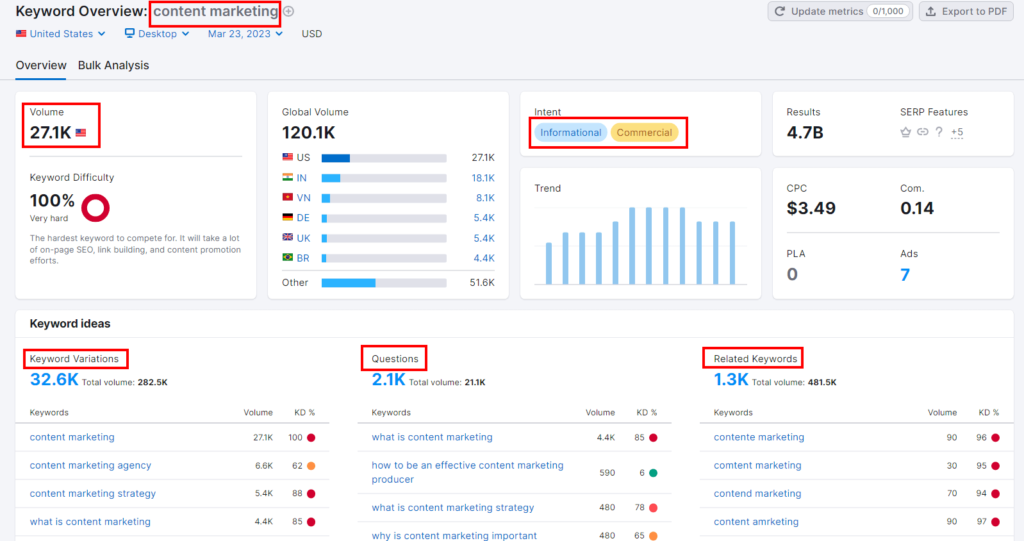
You can also get insights into the top keywords your website or your competitor’s website is ranking for. Extensive keyword research is the first step to creating profitable content for your website.

Semrush also helps you do SERP position tracking to constantly monitor your site’s SEO performance.
4. Build and Audit Your Link Profile
Another thing I have been using Semrush for is backlink building and link quality analysis. It helps me discover all incoming links and referring domains and also helps me analyze whether or not the link adds value to my website authority.
You can also use Semrush’s Backlink Checker to:
- Spot new backlinks to any domain.
- Get notified about lost backlinks.
- Identify the authority of the linking domain and the true value of the backlink.
- Research your competitors’ backlink strategy and analyze their link profiles.
- Discover your competitors’ most authoritative linking domains.
- Identify suspicious or toxic backlinks that could be harming your website’s search performance.
- Analyze backlink types by anchor type, link type, and link attributes.
- Find link-building opportunities.
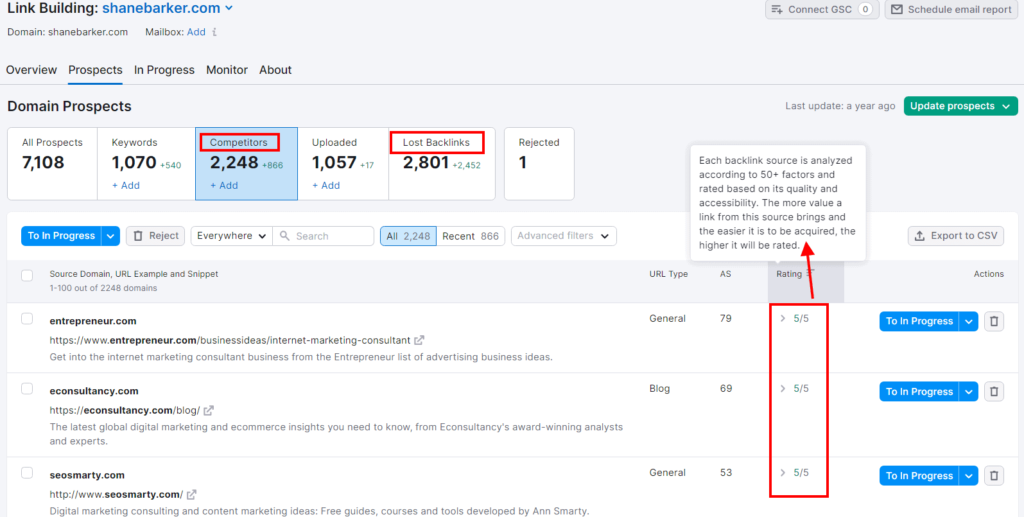
It can help empower your link building strategy and establish your authority in your niche. While you can also use other backlink analysis tools, I find Semrush to be a complete package for all SEO professionals.
5. Check Your Website for On-Page and Technical SEO Factors
This one is my favorite.
Semrush is the best tool in the market when it comes to on-page and technical SEO.
It gives you detailed analytics about your website – where it is lacking and what you can improve to increase your chances of ranking higher in search results.
Here are the key optimization metrics you can get data about:
- The total number of crawled pages on your website and their status
- Healthy
- Broken
- Have issues
- Top issues found on your website such as
- Duplicate H1 and title tags
- Broken external and internal links
- Missing meta descriptions
- Unstructured URLs
- Low word count on a page
- Duplicate content issues
- Use of non-descriptive anchor text
- Missing canonical tags
- Top pages to optimize and ideas for improvement
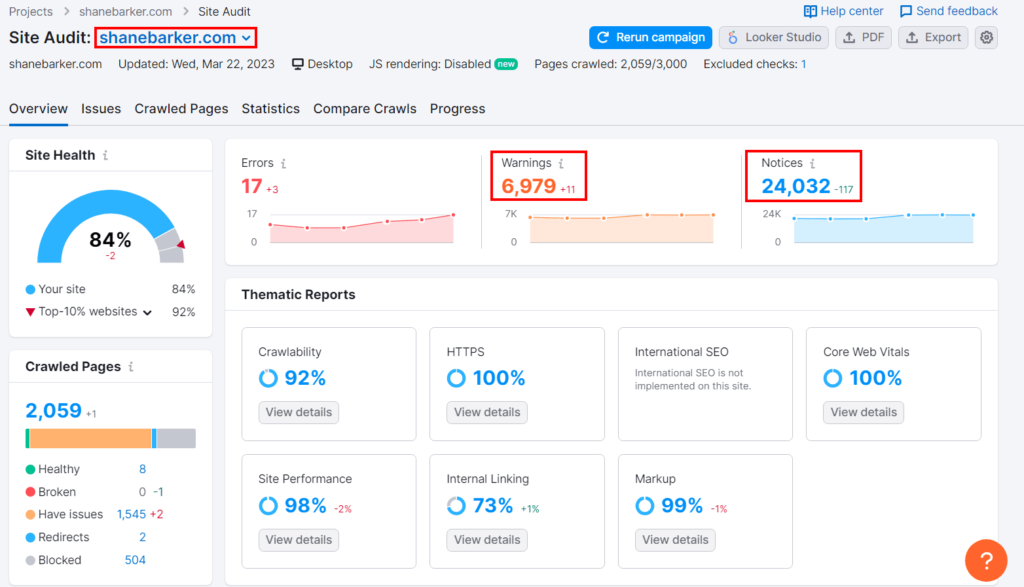
To learn more about its features, read my full review of Semrush.
Google Analytics: Reviewing Its Use Cases, Features, and Data
For a free tool, Google Analytics provides you with a wealth of data about your website’s traffic, audience, and user behavior.
Knowing exactly how my visitors find and use my website is extremely crucial to me, and it impacts my future content and website optimization strategy.
This is what I mostly use Google Analytics for.
1. Track and Analyze Website Traffic
Google Analytics helps you track how much traffic your website is getting each day, month, or year. You can compare your traffic growth over a period of time and also get insights about the traffic sources.
Google Analytics helps you track key metrics related to your website traffic.
- The number of unique visitors on your website
- On a specific day
- Over a period of time (You can visualize your website traffic growth YoY for 10 years straight. This is what I love about Google Analytics.)
- Traffic sources
- Direct traffic (when a user specifically types in your domain name)
- Organic search traffic (from Google and other search engines)
- Referral traffic (from links to your website placed on third-party websites)
- Social media traffic
- Ads
- Daily sessions
- A steady growth in daily sessions helps me ensure that my website is going the right way. Whereas, if the daily sessions are down, it’s a red flag that conveys there is something I need to fix on my website.
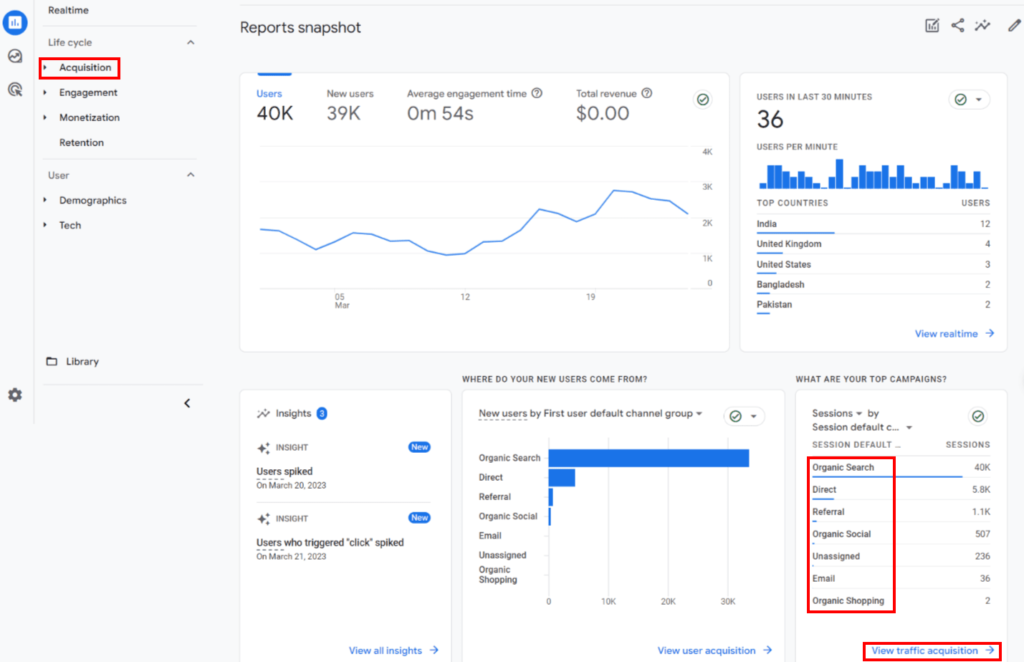
2. Understand the Audience Better
Google Analytics gives you detailed information about your website’s audience, including their demographic information, interests, and location.
- Users: See how many new and returning visitors you have, how much time they spend on your website, and how many pages they visit before bouncing off from your website.
- Audience demographics: Learn about the age group your visitors belong to and whether they are mostly men or women.
- Interests: Discover the main interests of your audience. Do they like to travel, read, or shop, or are they technology geeks?
- Location: See the geolocation of your website visitors. You can view their countries and cities.
- Devices: Get details about the devices they use to browse through your website. You can see your web and mobile traffic share.
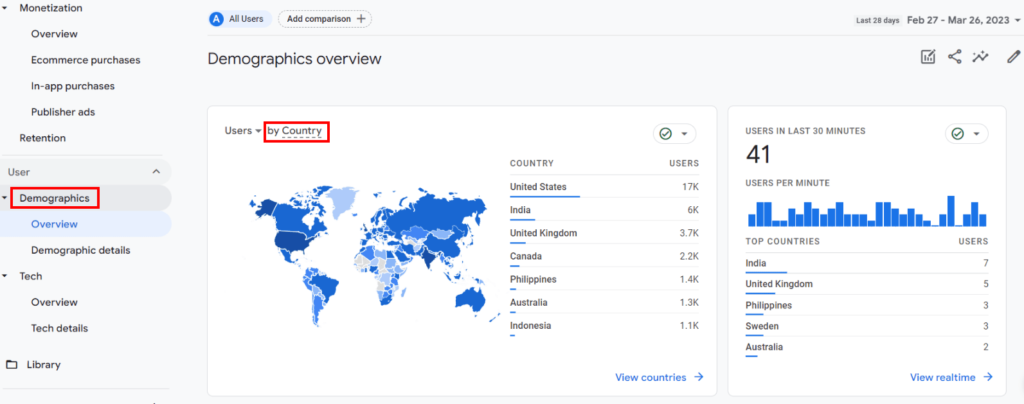
This data will help you understand who your target audience is, where they come from, and how you can tailor your content and marketing strategy to better reach and engage them.
3. Get Insights Into Content Performance and User Engagement
With Google Analytics, you can analyze how your website is performing and how users interact with your site and content.
It gives you insights about:
- The total number of pageviews
- Average time spent on each page
- Bounce rate (people leaving your website)
- Page loading speed
- The total number of unique searches on your website and popular search terms
- AdSense page impressions and revenue
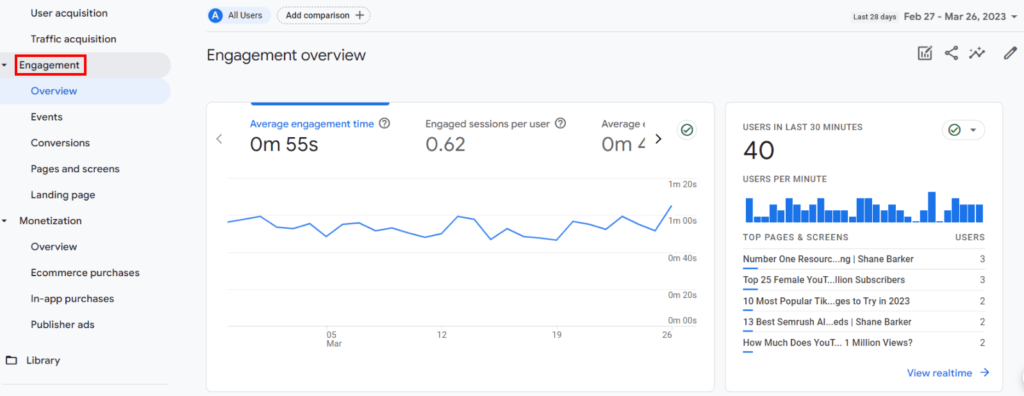
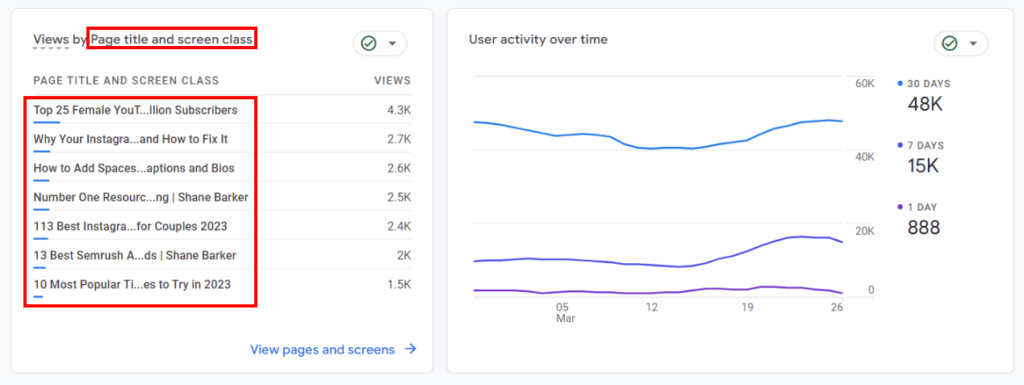
With these insights, you can optimize your SEO content strategy to increase your website’s traffic and user experience. Providing valuable content will also help you retain your customers and increase loyalty over time, which often results in higher revenue.
4. Track Conversions
You can also use Google Analytics to track your website conversions. Identify how many visitors are taking actions you want them to take.
These conversions could be anything, varying from:
- Signing up for your newsletter
- Clicking on an affiliate link on your website
- Sharing your post on social media
- Buying your product
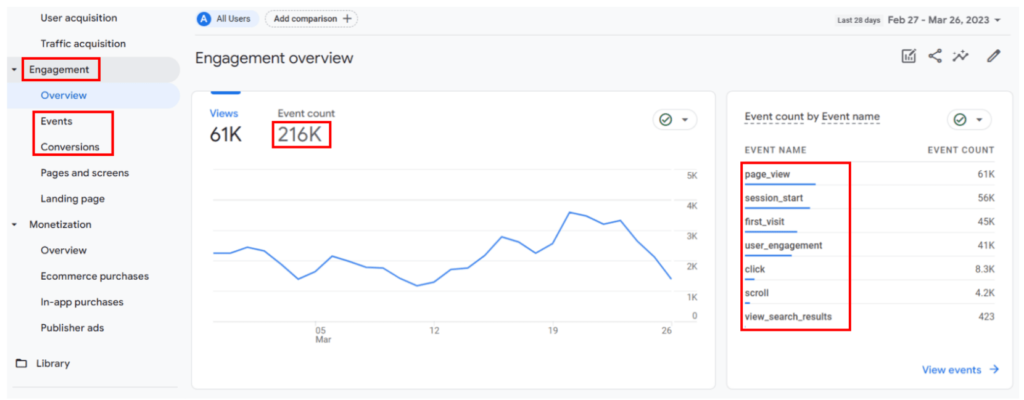
You can use these insights to optimize your website for conversions.
Semrush vs. Google Analytics: Data Collection
I use both Semrush and Google Analytics to run my website and support my clients’ businesses. There is no comparison between the data both tools offer to help improve my website and content performance.
Let me brief you on how these web analytics tools gather data.
How Does Semrush Gather Analytics Data?
Semrush gathers its analytics data by:
- Using its own machine learning algorithms
- Collecting data from multiple trusted third-party data providers and sources
For website traffic analytics data, Semrush combines data from the user behavior of over 200 million real internet users in 190 countries and regions.
To ensure accuracy, they run their Neural Network algorithm, which recognizes patterns in the collected data and provides you with a realistic estimation after sampling and error testing.
Semrush’s Backlink Crawler crawls over 25 billion web pages every day to identify and add new links to its database.
How Does Google Analytics Gather Data?
Google Analytics, on the other hand, gathers data directly from your website. It asks you to add a custom JavaScript tracking code within the code of the website you own or manage.
Every time a user visits your website, this code sends information to Google Analytics about how the user interacted with your web pages and content.
Semrush vs. Google Analytics: Pricing Plans
Semrush offers three pricing plans:
- Pro plan: $129.95/month
- Guru plan: $249.95/month
- Business plan: $499.95/month
You can save up to 17% if you pay annually.
Semrush offers a full refund if you decide to cancel your subscription or downgrade your plan within the first seven days.
You can try Semrush for free for 14 days (only with my link). But during free trials, the platform limits the amount of data you can pull every day.
Google Analytics offers all of this critical data, free of charge.
However, if your website receives millions of sessions per month, you may need to upgrade to Google Analytics 360. This can cost you millions of dollars but it will offer:
- Unlimited data
- Access to advanced reports
- Faster data updates
Google offers multiple free tools that can be extremely helpful for marketers and developers.
Semrush vs. Google Analytics: Are These Tools Competitors or Partners?
Semrush and Google Analytics are both essential analytics tools for website and business owners. They have different strengths.
As an avid user of both platforms, I can say that:
You can improve your website and content performance using Semrush and Google Analytics to your advantage. Here’s how I do it:
- Use Semrush for keyword research and filtering based on search volume and lower competition.
- Write the content and publish it on my website. Use Semrush’s SEO Writing Assistant to identify readability, SEO, and originality issues within the content. This helps me improve content quality and increase the chances of making it rank.
- Monitor my blog’s traffic using both Google Analytics and Semrush. Identify top pages and see how my recent posts are performing.
- Add the targeted keyword to Semrush’s position tracking to see improvement in the search performance of every published content piece.
- Use Google Analytics to see how users are interacting with my website – the pages they visit and which external links they click on.
- Regularly monitor GA daily sessions to evaluate if my website is going in the right direction. I’ve integrated Google Analytics sessions into Slack to receive notifications about daily sessions’ growth and decline.
I recommend that you integrate Google Analytics and Semrush to enhance data and reports, and, thereby, improve your marketing ROI.
How to Connect Google Analytics to Semrush
You can connect your Google Analytics and Google Search Console accounts to Semrush. This will help you analyze all of your website’s data in one place and enhance accuracy.
However, to connect a Google Analytics account to Semrush, you need to have at least “viewer” access.
Also, you’ll need to individually link Google Analytics to the following Semrush’s features:
- Position tracking
- Site audit
- Social media ads
You can integrate the following Semrush features with both Google Analytics and Google Search Console (GSC):
- On-page SEO checker
- Backlink audit
- Organic traffic insights
- Content analyzer
- SEO dashboard
To connect GSC to Semrush, you’ll need to have “owner or full user” access to the Google Search Console account.
Here’s how to integrate traffic analytics of both platforms:
You can refer to Semrush’s knowledge base to learn how to integrate GA and GSC with each of the features I mentioned above.
Semrush vs. Google Analytics: Which Tool Should You Choose?
I’ve said this multiple times throughout the article and I’ll repeat myself – you shouldn’t choose one above the other.
Both Semrush and Google Analytics are equally important web analytics tools for any website owner. I recommend that you make the most of both platforms to:
- Analyze your website traffic.
- Understand your audience and how they interact with your website.
- Identify keywords to target.
- Track SERP positions for multiple keywords.
- Identify and capitalize on link-building opportunities.
- Improve your website’s search performance and user experience.
I consider myself a pro user of both Semrush and Google Analytics and will continue to be so.
FAQs
1. Are Semrush and Google Analytics the same?
No, Semrush and Google Analytics are not the same.
Semrush offers many different ways to study and improve your website that Google Analytics cannot. You can use it to spy on your competitors, conduct keyword research, analyze backlink opportunities, and more.
Google Analytics, on the other hand, offers insightful data about how users interact with your website, where they come from, and which pages they spend the most time on. You can use it to understand your audience better and tailor your website and content to meet their needs.
Also, Google Analytics’ website traffic analytics data is more accurate than Semrush’s Traffic Analytics data for your website. That’s because GA directly gathers data from a code placed on your website.
2. Is Semrush better than Google Analytics?
It’s not about one tool being better than the other. Both Semrush and Google Analytics serve different purposes and complement the data provided by the other tool.
You should use:
– GA for traffic analysis and user behavior analysis
– Semrush for competitive research, keyword research, backlink audit, and link building
3. Can Semrush replace Google Analytics?
No, Semrush cannot replace Google Analytics. You should instead use it together with GA to enhance your website and content performance.
I’d like to encourage you to integrate your Google Analytics and Google Search Console accounts with Semrush’s different features to get the best of both worlds.
4. Does Semrush offer a refund guarantee for its services? What about Google Analytics’ refund policy?
Semrush offers a 7-day money-back guarantee if you cancel or downgrade your subscription within the first seven days of subscribing to it. They will refund your fees within 30 calendar days after receiving a written request for a refund from you.
Google Analytics is a free tool offered by Google. So, there is no need for a refund policy.
5. Does Google Analytics offer customer support? What about Semrush?
Google Analytics offers a range of support options for its users.
– A comprehensive Help Center with articles on multiple topics
– A community forum where you can ask and answer questions
– Email support for Google Ads customers
Semrush offers customer support via:
– Email and live chat for their paid subscribers
– A comprehensive knowledge base with hundreds of useful articles and video tutorials
– An email to [email protected] or by using the contact form on their website

